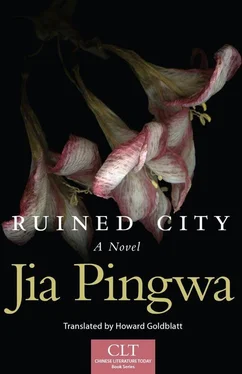Xiaoyi was beside himself with gratitude, saying he would never forget their kindness and would make sure his father thanked them personally once he was released. After walking Zhao out of the house, he went back inside, took out a few antiques and his father’s calligraphy, then returned home.
. . .
With the addition of Gong Jingyuan’s calligraphy, they held the press conference ahead of schedule, generating reports in all the media outlets. On the day the gallery opened, a huge crowd showed up to see Mao Zedong’s calligraphy. When the great man was alive, they could only see copies of his work, so it was a feast for the eyes when they could view the original 148 large characters. They had come mainly for Mao’s handwriting, but were pleasantly surprised to see a dazzling array of art by famous ancient and modern artists. The small gallery located outside a bustling business district gained instant fame, attracting many out-of-towners, even foreigners.
Niu Yueqing had been apprehensive about how they would get their hands on the bulk of Gong Jingyuan’s treasured collection. She brought it up once, but Zhuang told her to shut up. They sold a few pieces on opening day, and when Zhao brought over the money, Zhuang tossed it at Niu Yueqing. “This accomplished two things at once. As long as Gong Jingyuan gets out and has his hands intact, money will continue to flow in for him. Besides, we may be able to wean the father and son off their evil habits, and they’d thank us for that. No one has raised any concerns, so why must you worry so much? If people got wind of this, they would be convinced that we’d done something unsavory.”
Niu Yueqing kept her mouth shut from then on. Soon they heard that Gong had been released, and she prepared some gifts to take to him. They were not prepared for the news that came that afternoon — Gong Jingyuan had died. Shocked, Niu Yueqing ran over to see Zhuang at the gallery. He was busy putting up signs under some of the works, indicating that one was “sold at twenty-one thousand,” another “sold at five thousand,” and yet another “sold at thirty-five hundred.” It was a ploy to spur potential buyers into action by marking the works as sold. Tang Wan’er was there to decorate a newly installed display case for folk artwork, such as paper-cuts, shadow-play figurines, pillow covers, and shoe pads, as well as the pillowcase with a red maple leaf that had been nicely embroidered with red and green thread. People praised the handiwork, which went to Tang’s head; trying to be smart, she said that the so-called culture T-shirts that were popular on the streets had only a witty phrase or two. It would show good taste and draw buyers if a passage from an ancient text were copied onto a shirt in tiny print. They were having a good time talking and bantering, so they reeled from the shock when Niu Yueqing rushed in to inform them of Gong’s death. They quickly placed a call to Wang Ximian and Ruan Zhifei to verify the news; Wang and Ruan said they had heard it, too, but weren’t sure what had happened. Leaving everyone behind, Zhuang went home with Niu Yueqing. He thought about going to Gong’s house after lunch. Even if it turned out not to be true, he should go to see Gong anyway.
Xiaoyi came with the news while they were eating. Niu Yueqing cried before rushing out to buy black gauze. Zhuang called Zhao and asked him to buy a wreath, a stack of hemp paper, two packs of incense, and four large candles. Zhao quickly got them and came back, followed by Niu Yueqing, who had bought three yards of wool fabric instead of black gauze.
“Why did you buy such fine fabric?” Zhao asked “Do you think the dead can wear it in the underworld?”
“With Gong Jingyuan dead, life will be tough for his wife and Xiaoyi, so what’s the use of giving them black gauze? They could at least make some clothes out of the fabric here. There’s nothing you can do for the dead, so we should worry about the living. It’s just that they were used to a good life when he was alive, so his death means the disappearance of their wealth god. It’s easy for the poor to become rich, but hard for the rich to turn poor. I’m afraid mother and son will have a tough time from now on,” Niu Yueqing said tearfully.
“Your shimu is right,” Zhuang said to Zhao. “I’ve asked around and learned that Gong lost his mind before he died and destroyed everything in the house. His wife is still in Tianjin, and, Xiaoyi being Xiaoyi, well, it will be a sad sight at their house, with nothing left. Oh, right. Go buy three packages of opium from Liu Yezi and take them with us. Xiaoyi needs to take charge now, and I don’t think he has any opium left. He’s useless without it.”
It was dark out when the three of them rushed over to Gong’s house as soon as Zhao returned with the opium.
It was a well-preserved old-style compound, with four main rooms flanked by side rooms. In the relatively small yard, a toon tree as thick as a bucket had been planted at the spots where the eaves of the main rooms met the side room walls. There were artificial hills and trellises in the middle of the yard; on the sides of the entrance were a small room, a toilet, and the furnace room to heat the house in the winter. Zhuang, Zhao, and Niu Yueqing went straight to one of the central rooms; it was brightly lit, with no one inside. The lights were on in only two of the central rooms. To the east was Gong Jingyuan’s study, and to the west was the couple’s bedroom, with a room to receive guests in the center. In the middle of the main room, two black lacquered square tables had been pushed together, both with inlaid tabletops made of Lantian jade, surrounded by eight low drum-shaped stools. On each side of the door was an old-fashioned lattice window with plum flower carvings linked by carved ropes. Hung on the main wall were eight mahogany images carved in relief showing the famous calligraphers Wang Xizhi, Wang Xianzhi, Yan Zhenqing, Ouyang Xun, Liu Gongquan, Zhan Xu, Mi Fei, and Yu Youren. On the walls on the eastern and western sides hung framed calligraphy by Gong himself, one reading “Enjoy Life” and the other “Harmony.”
“No one died here. See, there’s no bier and no one is wailing,” Zhao said when a man with a mourning cloth wound around his head came out of one of the side rooms. “Ah, we have guests,” the man shouted. “In here.” Now they knew that the bier had been set up in a side room to the east, so they left the main room. In the middle of the room was a screen to separate a sleeping area from Gong’s large writing desk. On the desk, which had been prepared to serve as the bier, lay Gong’s body. It was covered in rice paper, with no blanket or sheet. Zhuang walked over to pull back the paper. Gong’s hair was a mess, framing his bluish-black face; his eyes and mouth were twisted, making for a terrifying sight. Niu Yueqing put her hands over her face and cried, “Why is he covered in paper? Don’t you have a blanket and sheet?”
One of the grieving relatives said that they had chosen to use rice paper because the blankets and sheets were too dirty. Niu Yueqing cried again while smoothing Gong’s lapel; she wailed until she fell to the edge of the bier when she saw that Gong was wearing the same old pair of shoes he had been wearing the time she ran into him at the City God Temple. Patting Gong’s face, Zhuang also teared up. “Brother Gong, how could you just die like that? How?” His chest tightened and he burst into tears. One of the relatives came over and offered them tea after they sat down.
Earlier, when Gong Jingyuan had come home and heard the story from Xiaoyi, he was enormously grateful to Zhuang, whom, to his regret, he hadn’t visited often, owing to his inflated view of his own talent and his addiction to gambling. Gong was particularly pleased when he learned how well his son had done this time, so he retrieved a suitcase from under the bed that contained bundles of bills totaling a hundred thousand yuan. He took out a stack and gave it to Xiaoyi to buy four bottles of Maotai, ten cartons of Hongtashan cigarettes, and three skeins of yarn and silk. He wanted to thank Zhuang Zhidie personally. Xiaoyi was astounded to see so much money.
Читать дальше


![Matthew Vincent - [you] Ruined It for Everyone!](/books/216429/matthew-vincent-you-ruined-it-for-everyone-thumb.webp)









